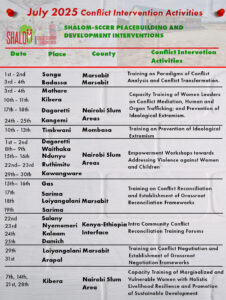By: Francis Mwangi MA,
Outlined below are the key 2022 Shalom-SCCRR, Outputs/Results achieved in 36 conflict locations where the organisation is engaged in Conflict Transformation and Peacebuilding; Schools/Educational Development; Women Empowerment and; Humanitarian interventions.
The metrics of success in our projects product delivery are espoused in the transformative impact we have consistently had on communities.
In 2022, Shalom-SCCRR interventions focused on ending manifest and structural violent conflict, transforming attitudes and behaviors; inculcating tolerance and inclusivity and; strengthening local/indigenous conflict management structures. These interventions have empowered grassroot communities in these violent conflict and marginalized locations to progressively become architects of their own inter-dependent future.
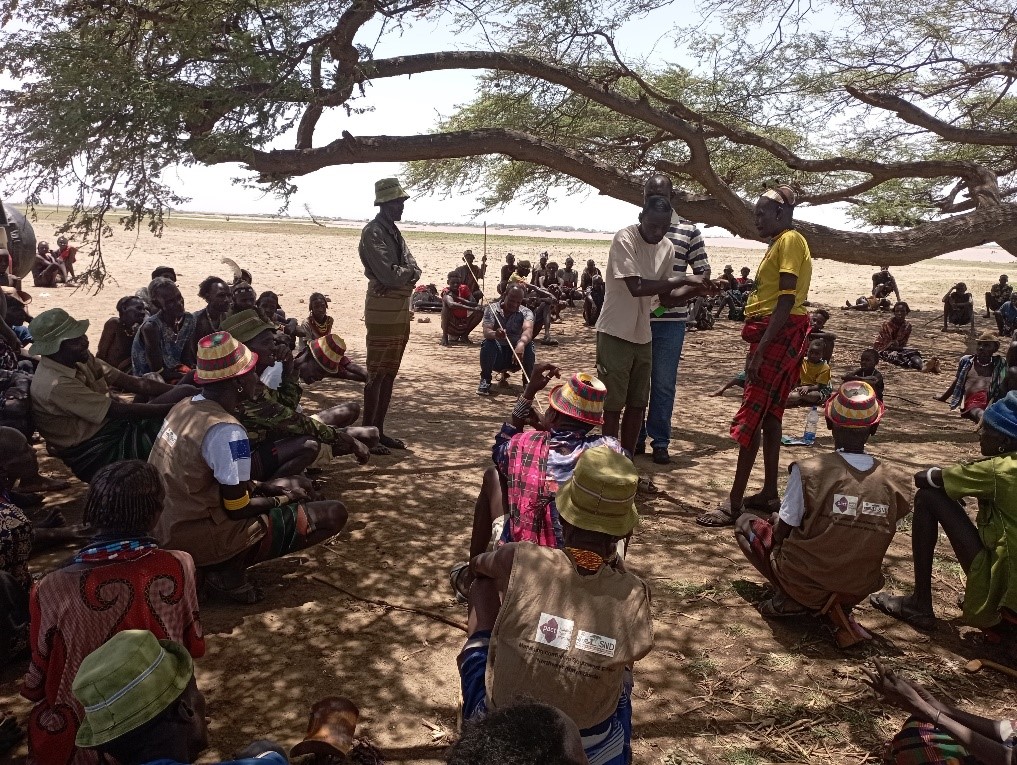
Development projects which benefit some of the most marginalized children in the world, disadvantaged by extreme poverty and violent conflict.
These projects are the Peace Dividends of Shalom-SCCRR’s conflict transformation and peacebuilding interventions.
Conflict Transformation & Peacebuilding Significant Outputs
125 Conflict transformation and Peacebuilding training workshops for 36 significant Shalom-SCCRR Peace Groups of influential opinion shapers in the urban informal settlement conflict hotspots, marginalized areas of northern Kenya and at the Kenya-Ethiopia-South Sudan-Uganda interface.
3,551 Members of Shalom-SCCRR Peace groups empowered with conflict analytical skills for designing and implementation of locally driven and sustained conflict transformation and peacebuilding initiatives.
17 training workshops on prevention of Religious Ideological Extremism in 5 project areas located in Nairobi and Mombasa informal settlements/slums in Kenya.
105 Shalom-SCCRR trained and supported Community Peace Resource Persons (Group Animators, Community Facilitators and Conflict and Peace Monitors) active in implementing locally established Conflict Monitoring Intervention (CMI) Mechanisms in 28 conflict locations (Kenya-Ethiopia-South Sudan-Uganda Interface, northern Kenya arid-areas, and urban informal settlements/slums) for timely and effective conflict interventions.
30 Prevention of Electoral-violence Workshops conducted in conflict hotspot areas – pre-Kenya’s 2022 general elections. Shalom-SCCRR trainers equipped its Peace groups with necessary skills to identify election-related conflict risks and to apply proactive conflict prevention interventions.
760 Women from informal urban settlements (slums) Empowered with analytical skills and Peacebuilding techniques, for Conflict Transformation and Reconciliation.
43% Women active involvement in Shalom-SCCRR local peacebuilding initiatives, a 7% increase compared to 2021 statistics.
University Elective Course offered by Shalom-SCCRR at Tangaza University College, Constituent College of The Catholic University of Eastern Africa; ‘Conflict Resolution and Reconciliation’, attended by Students of Theology and Islamic Studies from Africa, Europe, Asia and Latin America.
Impacts of Shalom-SCCRR, 2022
- Increased number of local peace actors and youths empowered with analytical skills in conflict transformation and peacebuilding.
- Active participation of the communities at the grassroot level in all peace processes leading to local ownership and sustainability of the collaborative peace product, and the resultant peace dividends.
- Strengthened social and economic structures stemming from the mutual intercommunal peace initiatives.
- Bolstered intercommunal social and cultural relationships; consequently, providing a favourable environment for local trade and farming activities.
- Increased safety for socio-economic infrastructures such as schools (including over 90% uninterrupted learning from violent conflict), health centers and markets where Shalom–SCCRR is implementing Conflict transformation and peacebuilding projects.
- Schools in conflict and marginalized locations experiencing inadequate and dilapidated infrastructures benefiting from the Shalom-SCCRR schools/educational projects which include construction of standard classrooms, sanitation and hygiene facilities, water supply systems, Solar Lighting systems, teaching and learning materials etc. This has improved: sitting ratios where 1 desk was shared by 4 to 5 learners to1:1, health of pupils and students and conducive rooms for teaching and learning among other outcomes.
- Enhanced culture of peace in schools through establishment of Peace Clubs whose Patrons and Members have been trained on Shalom-SCCRR peace education syllabus championing for change of attitudes and behavior from violence to coexistence, tolerance and harmonious inter-communal development.
- More women (43% in Shalom-SCCRR Peacebuilding projects) are active negotiators in peace processes at the grassroot level within their traditional ethnic communities and in the Urban Informal Settlements.
- Changed attitudes, perceptions and behavior between rival ethnic communities leading to improved levels of trust, cooperation and collaboration, resulting to mutually shared development in areas such as education and livelihood activities.
- Increased capacity of key local influential opinion shapers to prevent the increasing threat of youth radicalization and religious ideological extremism.
- Launched the Prof Wanakayi. K. Omoka Library at the Shalom-SCCRR Eastern Africa Headquarters at Karinde, Nairobi, Kenya.
Impacts of Shalom-SCCRR, 2009 – 2022
- Reduction of inter-ethnic based violent conflict incidents by an average of 67% in Shalom-SCCRR engaged project areas.
- Operational and effective locally developed and sustained Conflict Early Warning and Response Mechanisms preventing more than 60% of looming conflicts.
- More women participation as negotiators in peace processes among traditional ethnic communities (43% participation) in contexts where peace processes have been a preserve of the male-folk.
- Improved peace and security by 58% in areas where Shalom-SCCRR is intervening based on the monthly conflict incidents tracking. Thus, creating a supportive environment for development of local economy, stable and safe human settlement, health centers, and other social facilities.
- 90% success of uninterrupted learning in schools where Shalom-SCCRR is implementing conflict transformation and peacebuilding projects.
- Improved levels of trust, cooperation and collaboration between rival ethnic communities leading to joint development in areas such as: education, and livelihood activities.
- Prevented youth radicalization and religious ideological extremism in the urban slums through broad stakeholder engagement and capacity building trainings to local communities’ key influential opinion shapers, religious leaders, local government administrators and civil society actors.
Rev. Oliver Noonan, MA – Shalom-SCCRR Executive Director
Mr. Godfrey Okoth, MA (PhD Candidate) – Shalom-SCCRR Senior Project Officer
Mrs. Judith Akedi Otsieno MA, Shalom-SCCRR, Lead Project Officer (SEC)
Mr. Francis Mwangi, MA – Shalom-SCCRR Monitoring, Evaluation, Research and Learning Officer (MERL)
Mr. Kipkoech Kipruto, B. Com, ACCA, Accountant & Finance and Administration Officer
Ms. Esther Njeri Kibe MA, Shalom-SCCRR, Communications Department/Project Officer
Rev. Dr. Patrick. R. Devine – Shalom-SCCRR International Executive Chairman
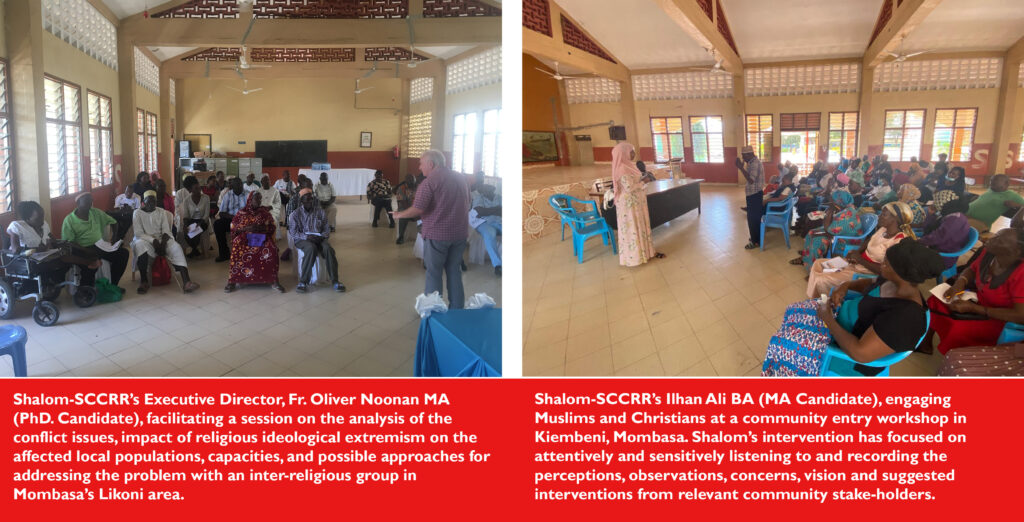
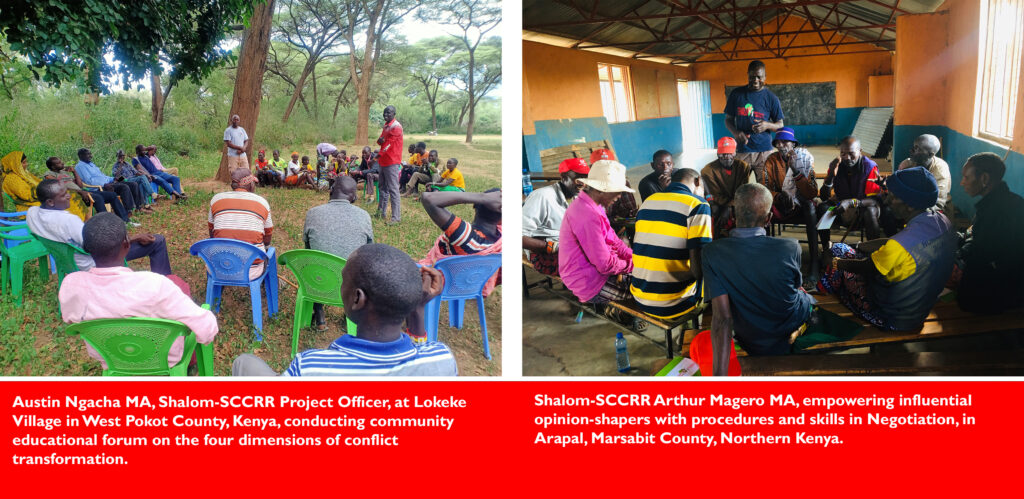
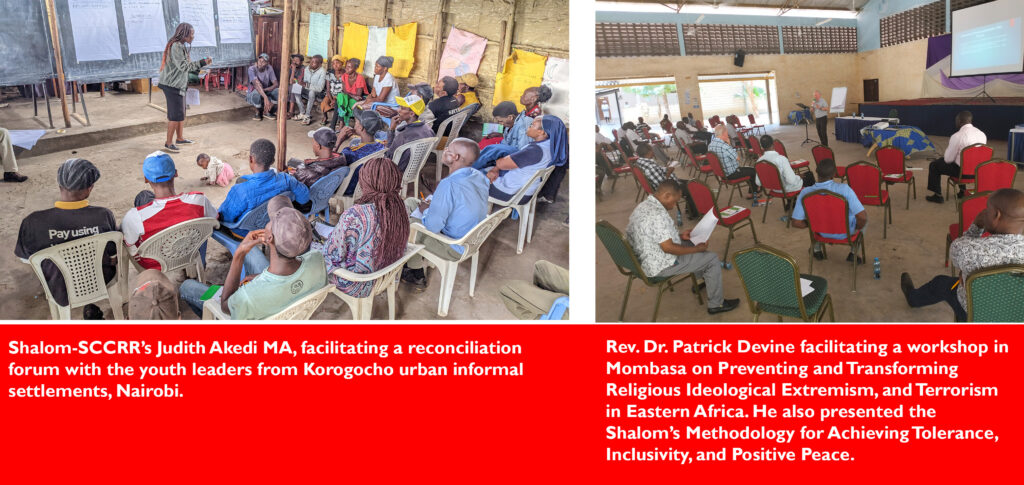
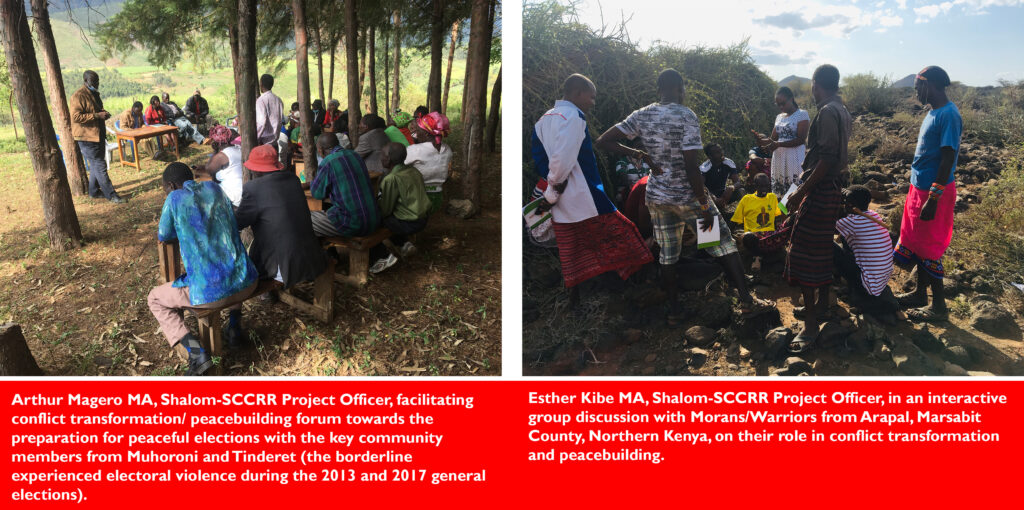
Author: Francis Mwangi, MA – Shalom-SCCRR Monitoring, Evaluation, Research and Learning Officer (MERL)
Relevant Links
- 2022 Shalom-SCCRR Results and Achievements. https://shalomconflictcenter.org/2022-shalom-sccrr-results-and-achievements-2/
- Shalom-SCCRR 2022 School/Educational Development Projects Results & Achievements.https://shalomconflictcenter.org/2022-shalom-sccrr-school-educational-development-projects-results-and-achievements/
- Shalom-SCCRR. (2023). Shalom Empowerment Center (SEC) 2022 Results & Achievements.https://shalomconflictcenter.org/2022-shalom-empowerment-center-sec-addressing-violence-against-women-and-children-results-and-achievements/
- Devine, P. R. (2022). Conflict Transformation and Peace-Building across Eastern Africa: Chairman’s Report on Progress in 2021. https://shalomconflictcenter.org/conflict-transformation-and-peace-building-across-eastern-africa-chairmans-report-on-progress-in-2021/
- Okoth, G. (2023). Shalom-SCCRR’s Data-Driven Peacebuilding Methodology: Progress in Mainstreaming Research as the basis for Communities’ Collective Action in Conflict Transformation and Peacebuilding. https://shalomconflictcenter.org/shalom-sccrrs-data-driven-peacebuilding-methodology/
- Moran, M. (2020). Eastern Africa: Shalom-SCCRR receives United Nations (UN) Accreditation.https://shalomconflictcenter.org/3901-2/
- Moran, M. (2022).Shalom Chairman delivers lecture at Harvard Kennedy School. https://shalomconflictcenter.org/shalom-chairman-delivers-lecture-at-harvard-kennedy-school/
- Kibe, E. (2022). Shalom-SCCRR’s International Chairman, Rev. Dr. Patrick Devine addresses the Harvard Kennedy School, USA.https://shalomconflictcenter.org/shalom-sccrrs-international-chairman-rev-dr-patrick-devine-addresses-the-harvard-kennedy-school-usa/
- Molumby G. (2022). Resolution of conflict requires hope and research. https://www.irishpost.com/news/resolution-of-conflict-requires-hope-and-research-238003
- Kibe, E. (2022). Fr. Patrick Devine PhD, Lecture at the National Justice & Peace Network (NJPN) Conference 2022, UK. https://shalomconflictcenter.org/fr-patrick-devine-phd-lecture-at-the-national-justice-peace-network-njpn-conference-2022-uk/
- Otsieno, J. (2023). Stellenbosch University, South Africa invited Rev. Patrick Devine PhD, from the Shalom Center for Conflict Resolution and Reconciliation (SCCRR) to present an academic module to its Masters of Divinity Students. https://shalomconflictcenter.org/stellenbosch-university-south-africa-invited-rev-patrick-devine-phd-from-the-shalom-center-for-conflict-resolution-and-reconciliation-sccrr-to-present-an-academic-module-to-its-masters-of-divinit/
- Noonan, O. (2015). Empowering the Pastoralist Communities of Eastern Africa. https://shalomconflictcenter.org/empowering-the-pastoralist-communities-of-eastern-africa/
- Devine, P. R. (2017). “Radicalization and Extremism in Eastern Africa; Dynamics and Drivers”, published in the Journal of Mediation and Applied Conflict Analysis, 4 (2): http://mural.maynoothuniversity.ie/9086/7/PD-Radicalisation-2017.pdf
- Okoth, G. & Mwangi, F. (2022). Shalom-SCCRR Facilitates at AMECEA Forum on Addressing Religious Ideological Extremism in Eastern Africa. https://shalomconflictcenter.org/shalom-sccrr-facilitates-amecea-forum-on-addressing-religious-ideological-extremism-in-eastern-africa/
- Okoth, G. (2023). Shalom-SCCRR mobilizes intervention towards de-radicalization and Counter-Violence Extremism on the Kenyan Coast.https://shalomconflictcenter.org/shalom-sccrr-mobilizes-intervention-towards-de-radicalization-and-counter-violence-extremism-on-the-kenyan-coast/
- Prof. Omoka. W. K and Devine, P. R. (2020). Human Rights are a Foundation of Shalom-SCCRR’s Conflict Resolution and Reconciliation Interventions. https://shalomconflictcenter.org/human-rights-are-a-foundation-of-shalom-sccrrs-conflict-resolution-and-reconciliation-interventions-2/
- Shalom-SCCRR. (2022). Shalom Empowerment Center (SEC) Addressing Violence against Women and Children: Concept Document. https://shalomconflictcenter.org/eastern-africa-shalom-empowerment-center-sec-addressing-violence-against-women-and-children-concept-document/
- Otsieno, J. & Kibe, E. (2022). Shalom Empowerment Center (SEC) Addressing Violence against Women and Children: A Unique Shalom-SCCRR Initiative Opened.https://shalomconflictcenter.org/shalom-empowerment-center-sec-addressing-violence-against-women-and-children-a-unique-shalom-sccrr-initiative-opened/
- Tembo, E. (2023). St. Josphat’s House (Kabiria-Riruta), A Place To Go; Some Shalom-SCCRR Projects in Action.https://shalomconflictcenter.org/st-josphats-house-kabiria-riruta-a-place-to-go-some-shalom-sccrr-projects-in-action/

